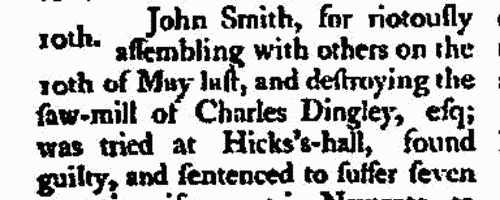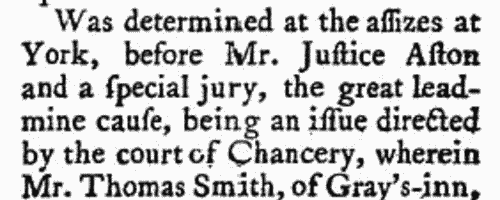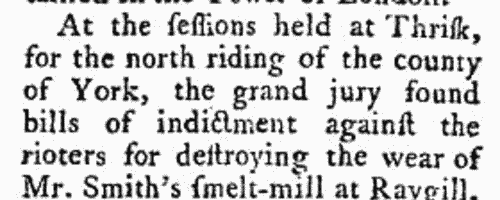More Surname Ancestry ResultsOur indexes 1000-1999 include entries for the spelling 'more'. In the period you have requested, we have the following 861 records (displaying 541 to 550): Single Surname Subscription | | | Buying all 861 results of this search individually would cost £4,506.00. But you can have free access to all 861 records for a year, to view, to save and print, for £100. Save £4,406.00. More... |
These sample scans are from the original record. You will get scans of the full pages or articles where the surname you searched for has been found. Your web browser may prevent the sample windows from opening; in this case please change your browser settings to allow pop-up windows from this site. People in the News
(1769)
Births, marriages and deaths, reports of crimes, trials and hangings, and general news, mainly from England, reported in the Chronicle section of the Annual RegisterMORE. Cost: £6.00.  | Sample scan, click to enlarge

| Merchants and traders in Newcastle-upon-Tyne
(1480-1770)
The society of Merchant Adventurers of Newcastle-upon-Tyne consisted of those who had obtained freedom of the city (allowing them to trade there) by birth as a son of, or apprenticeship, to a freeman: and within that, freedom of one of the three 'trades', i. e. boothman, draper or mercer. F. W. Dendy prepared extracts from the merchant adventurers' records, the first volume, published by the Surtees Society in 1895, containing extracts from the ordinances of the society through to 1894, the great majority being, however, from the 16th to 18th centuries. The Merchants' Company was founded with a series of enactments for their guidance and governance. But Dendy remarks that "Experience soon convinced them of the need of other laws, and these were framed from time to time. But during a very considerable period the members of the Society seem to have been influenced by a love of legislating, and their bye-laws increased to an unnecessary and perplexing extent." Indeed, many of the later ordinances amount to no more than minutes of particular orders aimed at particular people. MORE. Cost: £4.00.  | Sample scan, click to enlarge

|  Apprentices registered in Devonshire
(1770) Apprentices registered in Devonshire
(1770)
Apprenticeship indentures and clerks' articles were subject to a 6d or 12d per pound stamp duty: the registers of the payments usually give the master's trade, address, and occupation, and the apprentice's name, as well as details of the date and length of the apprenticeship. There are central registers for collections of the stamp duty in London, as well as returns from collectors in the provinces. These collectors generally received duty just from their own county, but sometimes from further afield. The indentures themselves can date from a year or two earlier than this return. (The sample entry shown on this scan is taken from a Durham return. Each entry has two scans, the other being the facing page with the details of the indenture, length of service, and payment of duty.) IR 1/57MORE. Cost: £8.00.  | Sample scan, click to enlarge

|  Apprentices registered in Scotland
(1770) Apprentices registered in Scotland
(1770)
Apprenticeship indentures and clerks' articles were subject to a 6d or 12d per pound stamp duty: the registers of the payments usually give the master's trade, address, and occupation, and the apprentice's name, as well as details of the date and length of the apprenticeship. There are central registers for collections of the stamp duty in London, as well as returns from collectors in the provinces. These collectors generally received duty just from their own county, but sometimes from further afield. The indentures themselves can date from a year or two earlier than this return. (The sample entry shown on this scan is taken from a Durham return. Each entry has two scans, the other being the facing page with the details of the indenture, length of service, and payment of duty.) IR 1/57MORE. Cost: £8.00.  | Sample scan, click to enlarge

|  Masters of apprentices registered in Scotland
(1770) Masters of apprentices registered in Scotland
(1770)
Apprenticeship indentures and clerks' articles were subject to a 6d or 12d per pound stamp duty: the registers of the payments usually give the master's trade, address, and occupation, and the apprentice's name, as well as details of the date and length of the apprenticeship. There are central registers for collections of the stamp duty in London, as well as returns from collectors in the provinces. These collectors generally received duty just from their own county, but sometimes from further afield. The indentures themselves can date from a year or two earlier than this return. (The sample entry shown on this scan is taken from a Durham return. Each entry has two scans, the other being the facing page with the details of the indenture, length of service, and payment of duty.) IR 1/57MORE. Cost: £8.00.  | Sample scan, click to enlarge

| People in the News
(1770)
Births, marriages and deaths, reports of crimes, trials and hangings, and general news, mainly from England, reported in the Chronicle section of the Annual RegisterMORE. Cost: £6.00.  | Sample scan, click to enlarge

|  Apprentices registered in Scotland
(1771) Apprentices registered in Scotland
(1771)
Apprenticeship indentures and clerks' articles were subject to a 6d or 12d per pound stamp duty: the registers of the payments usually give the master's trade, address, and occupation, and the apprentice's name, as well as details of the date and length of the apprenticeship. There are central registers for collections of the stamp duty in London, as well as returns from collectors in the provinces. These collectors generally received duty just from their own county, but sometimes from further afield. The indentures themselves can date from a year or two earlier than this return. (The sample entry shown on this scan is taken from a Durham return. Each entry has two scans, the other being the facing page with the details of the indenture, length of service, and payment of duty.) IR 1/57MORE. Cost: £8.00.  | Sample scan, click to enlarge

|  Masters of apprentices registered in Scotland
(1771) Masters of apprentices registered in Scotland
(1771)
Apprenticeship indentures and clerks' articles were subject to a 6d or 12d per pound stamp duty: the registers of the payments usually give the master's trade, address, and occupation, and the apprentice's name, as well as details of the date and length of the apprenticeship. There are central registers for collections of the stamp duty in London, as well as returns from collectors in the provinces. These collectors generally received duty just from their own county, but sometimes from further afield. The indentures themselves can date from a year or two earlier than this return. (The sample entry shown on this scan is taken from a Durham return. Each entry has two scans, the other being the facing page with the details of the indenture, length of service, and payment of duty.) IR 1/57MORE. Cost: £8.00.  | Sample scan, click to enlarge

| People in the News
(1771)
Births, marriages and deaths, reports of crimes, trials and hangings, and general news, mainly from England, reported in the Chronicle section of the Annual RegisterMORE. Cost: £6.00.  | Sample scan, click to enlarge

|  Apprentices registered in Scotland
(1772) Apprentices registered in Scotland
(1772)
Apprenticeship indentures and clerks' articles were subject to a 6d or 12d per pound stamp duty: the registers of the payments usually give the master's trade, address, and occupation, and the apprentice's name, as well as details of the date and length of the apprenticeship. There are central registers for collections of the stamp duty in London, as well as returns from collectors in the provinces. These collectors generally received duty just from their own county, but sometimes from further afield. The indentures themselves can date from a year or two earlier than this return. (The sample entry shown on this scan is taken from a Bristol return. Each entry has two scans, the other being the facing page with the details of the indenture, length of service, and payment of duty.) IR 1/58MORE. Cost: £8.00.  | Sample scan, click to enlarge

|
Research your ancestry, family history, genealogy and one-name study by direct access to original records and archives indexed by surname.
|













